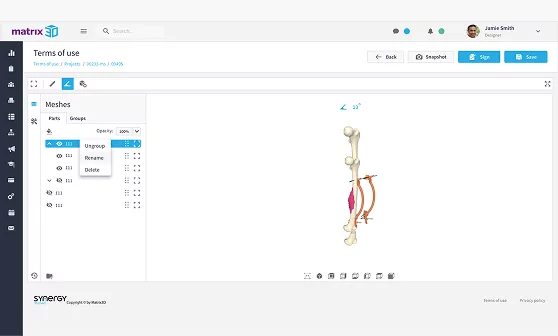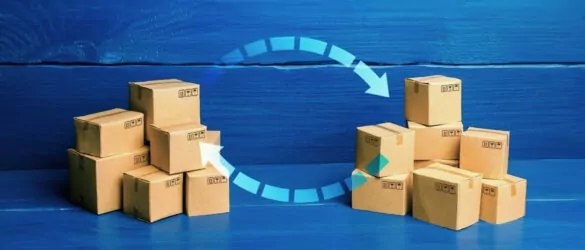This comprehensive guide will delve into cutting-edge solutions that redefine supply chain orchestration, providing advanced features, real-time visibility, and scalability. From streamlining route planning and optimizing inventory to ensuring compliance and fostering data-driven decision-making, these software solutions are poised to shape the future of logistics operations in 2024.
Join us as we navigate through the key features, benefits, and unique offerings of these top-tier logistics management software, positioning businesses at the forefront of a dynamic and competitive logistics landscape.
- What is logistics management software?
- Why Use Logistics Management Software
- LMS provides transportation management system
- LMS provides technical expertise
- LMS helps plan and monitor supply chain activities
- LMS helps enhance customer satisfaction
- Upper
- Brightpearl
- Zoho Inventory
- Oracle
- SAP
- Acumatica
- NetSuite
- Salesforce
- Magaya
- FreightPOP
- Precoro
- Simplify your container logistics with Inoxoft
- Conclusion
What is logistics management software?
Logistics management system, also known as logistics management software help businesses automate, simplify, and optimize their processes. Businesses use digital technologies to supervise the following supply chain tasks:
- order processing
- transportation planning
- distribution
- supplies and suppliers
- supplies and suppliers
- warehouse and inventory management
Primary goal of LMS is to enhance efficiency, reduce costs, and provide real-time visibility into the movement of goods across the entire supply chain.
The software for logistics management serves as a centralized platform that seamlessly integrates various supply chain processes. This allows companies to streamline communication, make informed decisions, and swiftly adapt to market demands. An indispensable tool for managing warehouses and optimizing routes, a logistics management system (LMS) ensures smooth and efficient operations. With the ever-changing global market, utilizing an LMS is crucial for maintaining a competitive edge and achieving overall success.
Why Use Logistics Management Software
LMS provides transportation management system
Transport management system (TMS) is one of the main features of logistics management software. The physical movement of goods, both incoming and outgoing, can be planned, carried out, and optimized with the use of a TMS. Jobs like inventory control, order tracking, route optimization, data entry, and reporting can all be automated and made easier with a TMS. To enhance effectiveness, affordability, and customer service, a TMS can also offer real-time visibility, data analytics, and decision support.
A TMS is helpful for companies like manufacturers, distributors, e-commerce platforms, retailers, and logistics service providers that frequently ship, move, and receive goods. With a TMS, they can:
- Lower operating costs can be achieved by comparing prices, carriers, and transportation options, as well as by getting rid of inefficiencies and human mistakes.
- Boost productivity through the automation and simplification of workflows, as well as the facilitation of quicker and more precise data processing and communication.
- Ensure data accuracy and consistency by gathering and combining data from multiple sources, including sensors, IoT devices, and customer feedback.
- Reduce mistakes and hazards by identifying and stopping flaws, mistakes, and malfunctions, as well as by making sure rules and guidelines are followed.
- Assigning repetitive and low-value tasks to software robots and producing insights and recommendations based on data analysis, free up time for value-added activities and strategic decision-making.
LMS provides technical expertise
Technical expertise is provided by the logistics management software. In logistics, such as data analysis, system integration, software development and troubleshooting, technical expertise refers to the knowledge and skills required to carry out complex and specialised tasks. In order to improve their logistics operations, businesses may benefit from technical expertise by:
- Solving technical problems and challenges. Logistics management software can help businesses overcome technical difficulties and issues that may arise in their logistics processes, such as system errors, data inconsistencies, or compatibility issues. Logistics management software can provide technical support and guidance, such as troubleshooting, debugging, or updating, to help businesses resolve their problems quickly and effectively.
- Implementing best practices and standards. Logistics management software can help businesses follow and adopt the best practices and standards in logistics, such as quality assurance, security, compliance, and performance. Logistics management software can provide technical expertise and recommendations, such as auditing, testing, or benchmarking, to help businesses ensure their logistics processes meet the industry and regulatory requirements.
- Innovating and improving logistics solutions. Logistics management software can help businesses innovate and improve their logistics solutions, such as creating new features, functionalities, or applications, or enhancing existing ones. Logistics management software can provide technical expertise and resources, such as development tools, frameworks, or libraries, to help businesses design, develop, and deploy their logistics solutions.
LMS helps plan and monitor supply chain activities
Logistics management software helps you plan and monitor supply chain activities, which are the processes and tasks involved in moving goods and materials from the source to the destination. Planning and monitoring supply chain activities are useful because they can help you to:
- Optimize your supply chain performance. Logistics management software can help you plan your supply chain activities by analyzing data from various sources, such as demand, supply, inventory, and transportation, and providing insights and recommendations on how to optimize your supply chain network, such as selecting the best suppliers, carriers, routes, and modes of transportation. Logistics management software can also help you monitor your supply chain activities by providing real-time visibility, alerts, and reports on the status, location, and condition of your goods and materials, and enabling you to track and measure your key performance indicators (KPIs), such as delivery time, cost, quality, and customer satisfaction.
- Reduce your supply chain risks. Logistics management software can help you plan and monitor your supply chain activities by identifying and mitigating potential risks and disruptions that may affect your supply chain operations, such as demand fluctuations, supply shortages, weather events, accidents, or compliance issues. Logistics management software can also help you plan and monitor your supply chain activities by providing backup options, such as alternative suppliers, carriers, routes, and modes of transportation, and enabling you to respond quickly and effectively to any changes or emergencies.
- Improve your supply chain collaboration. Logistics management software can help you plan and monitor your supply chain activities by facilitating and enhancing your communication and coordination with your supply chain partners, such as suppliers, carriers, distributors, and customers. Logistics management software can also help you plan and monitor your supply chain activities by providing a single platform and a common data source for all your supply chain stakeholders, and enabling you to share information, data, and feedback, and to align your goals and expectations.
LMS helps enhance customer satisfaction
Logistics management software helps to enhance customer satisfaction by improving the quality, speed, and reliability of the delivery process. Customer satisfaction is a key factor in retaining and attracting customers, and creating a positive brand image. Some of the ways that logistics management software helps to enhance customer satisfaction are:
- Providing real-time visibility and communication. Logistics management software can provide real-time visibility and communication to customers, by allowing them to track and trace their orders, receive notifications and alerts, and access relevant information and documents. This can help to reduce uncertainty and increase trust and confidence.
- Reducing delivery time and cost. Logistics management software can reduce delivery time and cost, by optimizing the routing, scheduling, and mode of transportation, and by finding the best rates and carriers. This can help to meet or exceed customer expectations, and offer competitive advantages.
- Ensuring delivery accuracy and quality. Logistics management software can ensure delivery accuracy and quality, by minimizing errors, defects, and damages, and by ensuring compliance with regulations and standards. This can help to avoid customer complaints, returns, and refunds, and increase customer satisfaction and loyalty.
- Offering personalized and flexible service. Logistics management software can offer personalized and flexible service, by allowing customers to choose their preferred delivery options, such as time, location, and method, and by providing customized solutions, such as special packaging, labeling, or handling. This can help to create a positive customer experience, and increase customer retention and referrals.
Upper
Upper is a logistics management software that specializes in route planning and optimization. It helps businesses to plan, execute, and optimize their transportation and delivery operations, by automating and simplifying tasks such as data entry, inventory management, order tracking, route optimization, and reporting. Upper also provides real-time visibility, data analytics, and decision support to improve efficiency, cost, and customer service.
Some of the features and benefits of Upper are:
- Effortless route planning: Upper allows users to import multiple stops using CSV or Excel files, and to add priorities and time windows to each stop. Upper then generates optimized routes for multiple vehicles in one click, saving time and reducing fuel costs.
- Enhanced customer satisfaction: Upper provides real-time visibility and communication to customers, by allowing them to track and trace their orders, receive notifications and alerts, and access relevant information and documents.
- Proof of delivery: Upper enables users to capture in-app signatures and photos for instant proof of delivery, streamlining paperwork and resolving disputes. This logistics software also provides reports and summaries for flawless record-keeping.
- Live support: Upper offers constant around-the-clock support to users, ensuring that their routing is uninterrupted and agile.
Brightpearl
Brightpearl is a logistics management software that offers a comprehensive solution for retail and wholesale businesses. It helps businesses to manage their inventory, orders, shipping, accounting, and reporting, across multiple channels and locations. Brightpearl also provides real-time data and insights, automation and integration, and customer service and support.
Some of the features and benefits of Brightpearl are:
- Inventory management: Brightpearl allows users to track and control their inventory levels, movements, and costs, across multiple warehouses and sales channels. Brightpearl also supports various inventory methods, such as FIFO, LIFO, average cost, and various inventory types, such as serialized, batch, and bundle.
- Order management: Brightpearl enables users to process and fulfill orders from various sources, such as online, offline, phone, or email, in one centralized system. Brightpearl also automates and streamlines workflows, such as order allocation, picking, packing, shipping, invoicing, and returns.
- Shipping and fulfillment: Brightpearl integrates with various shipping and fulfillment providers, such as FedEx, UPS, DHL, and Amazon FBA, to offer fast and reliable delivery options to customers. Brightpearl also provides real-time visibility and communication, by allowing users and customers to track and trace their orders, receive notifications and alerts, and access relevant information and documents.
- Accounting and reporting: Brightpearl connects with various accounting and reporting tools, such as QuickBooks, Xero, and Google Analytics, to provide accurate and timely financial and operational data. Brightpearl also offers built-in reports and dashboards, such as profit and loss, cash flow, sales, and inventory, to help users monitor and optimize their business performance.
- Customer service and support: Brightpearl provides customer service and support, by allowing users to manage and respond to customer inquiries, issues, and feedback, from various channels, such as email, phone, or chat, in one unified system. Brightpearl also offers customer relationship management (CRM) features, such as contact management, segmentation, and marketing, to help users build and maintain customer loyalty and retention.
Zoho Inventory
Zoho Inventory is a logistics management software that focuses on inventory management and order fulfillment. It helps businesses to manage their stock levels, movements, and costs, across multiple warehouses and sales channels. Zoho Inventory also integrates with various applications and systems, such as Zoho CRM, Zoho Books, Shopify, Amazon, and FedEx, to provide a seamless and efficient logistics operation.
Some of the features and benefits of Zoho Inventory are:
- Inventory control: Zoho Inventory allows users to track and manage their inventory in real-time, using barcode scanning, serial number tracking, batch tracking, and item kitting. Zoho Inventory also supports various inventory methods, such as FIFO, LIFO, and average cost, and various inventory types, such as serialized, batch, and bundle.
- Order management: Zoho Inventory enables users to process and fulfill orders from various sources, such as online, offline, phone, or email, in one centralized system. Zoho Inventory also automates and streamlines workflows, such as order allocation, picking, packing, shipping, invoicing, and returns.
- Shipping and fulfillment: Zoho Inventory integrates with various shipping and fulfillment providers, such as FedEx, UPS, DHL, and Amazon FBA, to offer fast and reliable delivery options to customers. Zoho Inventory provides real-time visibility and communication, by allowing users and customers to track and trace their orders, receive notifications and alerts, and access relevant information and documents.
- Reporting and analytics: Zoho Inventory provides various reports and dashboards, such as inventory valuation, stock movement, sales order, and purchase order, to help users monitor and optimize their logistics performance. Zoho Inventory also offers data analytics and insights, such as inventory turnover, stock availability, and sales trends, to help users make informed and data-driven decisions.
Oracle
Oracle is a logistics management software that offers a comprehensive solution for transportation, global trade, and distribution. It helps businesses to plan, execute, and optimize their logistics operations, by automating and simplifying tasks such as data entry, inventory management, order tracking, route optimization, and reporting. Oracle also provides real-time visibility, data analytics, and decision support to improve efficiency, cost, and customer service.
Some of the features and benefits of Oracle are:
- Transportation management: Oracle allows users to manage all transportation activity throughout their global supply chain, from simple point-to-point to complex multimodal, multileg, and cross-dock operations. Oracle also helps users to find the best rates, carriers, and modes of transportation, and to ensure compliance with regulations and standards.
- Global trade management: Oracle enables users to streamline and automate their cross-border business processes, such as customs clearance, trade compliance, and duty management. Oracle also helps users to mitigate financial risk related to custom fines, penalties, and storage fees, and to access global trade content and intelligence.
- Distribution management: Oracle empowers users to optimize their distribution network, by managing their inventory, orders, shipping, and fulfillment across multiple warehouses and sales channels. Oracle also helps users to improve their material handling efficiency and labor productivity, and to offer omnichannel delivery options to customers.
- Logistics network modeling: Oracle supports users to design and evaluate their logistics network, by using data and analytics to create what-if scenarios and compare different alternatives. Oracle also helps users to adapt to supply chain disruptions and changes, and to identify new opportunities and solutions.
SAP
SAP is a logistics management software that offers a comprehensive solution for transportation, global trade, and distribution. It helps businesses to plan, execute, and optimize their logistics operations, by automating and simplifying tasks such as data entry, inventory management, order tracking, route optimization, and reporting. SAP also provides real-time visibility, data analytics, and decision support to improve efficiency, cost, and customer service.
Some of the features and benefits of SAP are:
- Transportation management: SAP allows users to manage all transportation activity throughout their global supply chain, from simple point-to-point to complex multimodal, multileg, and cross-dock operations. SAP also helps users to find the best rates, carriers, and modes of transportation, and to ensure compliance with regulations and standards.
- Distribution management: SAP empowers users to optimize their distribution network, by managing their inventory, orders, shipping, and fulfillment across multiple warehouses and sales channels. SAP also helps users to improve their material handling efficiency and labor productivity, and to offer omnichannel delivery options to customers.
- Logistics network modeling: SAP supports users to design and evaluate their logistics network, by using data and analytics to create what-if scenarios and compare different alternatives. SAP also helps users to adapt to supply chain disruptions and changes, and to identify new opportunities and solutions.
- Intelligent technologies: SAP leverages various intelligent technologies, such as machine learning, digital assistant, blockchain, and Internet of Things (IoT), to enhance and automate their logistics processes and decisions. SAP also helps users to gain insights and recommendations, and to create intelligent and connected logistics systems and applications.
Acumatica
Acumatica is a logistics management software that offers a cloud-based solution for enterprise resource planning (ERP). It helps businesses to manage their supply chain and logistics functions, such as inventory, order, warehouse, and transportation management. Acumatica also integrates with various applications and systems, such as CRM, accounting, ecommerce, and shipping, to provide a seamless and efficient logistics operation.
Some of the features and benefits of Acumatica are:
- Inventory management: Acumatica allows users to track and control their inventory levels, movements, and costs, across multiple warehouses and sales channels. Acumatica also supports various inventory methods, such as FIFO, LIFO, and average cost, and various inventory types, such as serialized, batch, and bundle.
- Order management: Acumatica enables users to process and fulfill orders from various sources, such as online, offline, phone, or email, in one centralized system. Acumatica also automates and streamlines workflows, such as order allocation, picking, packing, shipping, invoicing, and returns.
- Warehouse management: Acumatica empowers users to optimize their warehouse operations, by managing their material handling, storage, and distribution activities. Acumatica helps users to improve their warehouse efficiency and productivity, by using barcode scanning, RFID, and IoT devices.
- Transportation management: Acumatica supports users to manage all transportation activities throughout their global supply chain, from simple point-to-point to complex multimodal, multileg, and cross-dock operations. Acumatica also helps users to find the best rates, carriers, and modes of transportation, and to ensure compliance with regulations and standards.
- Reporting and analytics: Acumatica provides various reports and dashboards, such as inventory valuation, stock movement, sales order, and purchase order, to help users monitor and optimize their logistics performance. Acumatica also offers data analytics and insights, such as inventory turnover, stock availability, and sales trends, to help users make informed and data-driven decisions.
NetSuite
NetSuite is a logistics management software that offers a comprehensive solution for transportation, global trade, and distribution. It helps businesses to plan, execute, and optimize their logistics operations, by automating and simplifying tasks such as data entry, inventory management, order tracking, route optimization, and reporting. NetSuite also provides real-time visibility, data analytics, and decision support to improve efficiency, cost, and customer service.
Some of the features and benefits of NetSuite are:
- Transportation management: NetSuite allows users to manage all transportation activity throughout their global supply chain, from simple point-to-point to complex multimodal, multileg, and cross-dock operations. NetSuite also helps users to find the best rates, carriers, and modes of transportation, and to ensure compliance with regulations and standards
- Global trade management: NetSuite enables users to streamline and automate their cross-border business processes, such as customs clearance, trade compliance, and duty management. NetSuite also helps users to mitigate financial risk related to custom fines, penalties, and storage fees, and to access global trade content and intelligence.
- Distribution management: NetSuite empowers users to optimize their distribution network, by managing their inventory, orders, shipping, and fulfillment across multiple warehouses and sales channels. NetSuite also helps users to improve their material handling efficiency and labor productivity, and to offer omnichannel delivery options to customers.
- Logistics network modeling: NetSuite supports users to design and evaluate their logistics network, by using data and analytics to create what-if scenarios and compare different alternatives. NetSuite also helps users to adapt to supply chain disruptions and changes, and to identify new opportunities and solutions.
- Intelligent technologies: NetSuite leverages various intelligent technologies, such as machine learning, digital assistant, blockchain, and Internet of Things (IoT), to enhance and automate their logistics processes and decisions.
Salesforce
Salesforce is a logistics management software that integrates customer relationship management (CRM) with transportation, global trade, and distribution. It helps businesses to plan, execute, and optimize their logistics operations, by automating and simplifying tasks such as data entry, inventory management, order tracking, route optimization, and reporting. Salesforce also provides real-time visibility, data analytics, and decision support to improve efficiency, cost, and customer service.
Some of the features and benefits of Salesforce are:
- CRM integration: Salesforce allows users to manage and enhance their relationships with their customers, partners, and employees, across various channels and platforms. Salesforce also helps users to segment and target their customers based on various criteria, such as demographics, psychographics, behavior, and needs, and to offer personalized and relevant products, services, and experiences.
- Transportation management: Salesforce enables users to manage all transportation activity throughout their global supply chain, from simple point-to-point to complex multimodal, multileg, and cross-dock operations. Salesforce also helps users to find the best rates, carriers, and modes of transportation, and to ensure compliance with regulations and standards.
- Global trade management: Salesforce supports users to streamline and automate their cross-border business processes, such as customs clearance, trade compliance, and duty management. Salesforce also helps users to mitigate financial risk related to custom fines, penalties, and storage fees, and to access global trade content and intelligence.
- Distribution management: Salesforce empowers users to optimize their distribution network, by managing their inventory, orders, shipping, and fulfillment across multiple warehouses and sales channels. Salesforce also helps users to improve their material handling efficiency and labor productivity, and to offer omnichannel delivery options to customers.
- Intelligent technologies: Salesforce leverages various intelligent technologies, such as machine learning, digital assistant, blockchain, and Internet of Things (IoT), to enhance and automate their logistics processes and decisions. Salesforce also helps users to gain insights and recommendations, and to create intelligent and connected logistics systems and applications.
Magaya
Magaya is a logistics management software that specializes in automation and integration. It helps businesses to automate and simplify their logistics processes, such as data entry, inventory management, order tracking, customs compliance, and reporting. Magaya also integrates with various applications and systems, such as accounting, ecommerce, and shipping, to provide a seamless and efficient logistics operation.
Some of the features and benefits of Magaya are:
- Automation: Magaya allows users to automate and streamline their workflows, such as creating bookings, pickup orders, warehouse receipts, shipments, and invoices, by pulling information directly from quotes, saving time and reducing errors. Magaya also automates and simplifies tasks such as data entry, validation, calculation, and extraction, by using barcode scanning, RFID, and IoT devices.
- Integration: Magaya connects with various applications and systems, such as accounting, ecommerce, and shipping, to exchange data and information in real time, and to enable seamless workflows between different departments and partners. Magaya also integrates with Magaya Network, an electronic network of thousands of other forwarders and agents worldwide, to facilitate collaboration and communication.
- Customization: Magaya offers a flexible and modular solution that can be customized and scaled to meet the unique needs and preferences of each business. Magaya also provides a collection of apps and extensions, as well as an open API, that allow users to add or modify features and functionalities to their system.
- Support: Magaya provides constant around-the-clock support to users, ensuring that their logistics operation is uninterrupted and agile. Magaya also offers training and consulting services, as well as online resources and documentation, to help users learn and use the system effectively.
FreightPOP
FreightPOP is a logistics management software that specializes in shipping and freight management. It helps businesses to compare rates, book shipments, track deliveries, and audit invoices, across multiple modes and carriers. FreightPOP also integrates with various applications and systems, such as ERP, CRM, ecommerce, and accounting, to provide a seamless and efficient logistics operation.
Some of the features and benefits of FreightPOP are:
- Rate shopping: FreightPOP allows users to compare rates and services from various carriers and brokers, such as FedEx, UPS, DHL, and CH Robinson, for parcel, LTL, FTL, air, and ocean shipments. FreightPOP also helps users to find the best rates and carriers based on their preferences, such as time, cost, and reliability.
- Shipping and tracking: FreightPOP enables users to book and manage shipments from various sources, such as online, offline, phone, or email, in one centralized system. FreightPOP also provides real-time visibility and communication, by allowing users and customers to track and trace their shipments, receive notifications and alerts, and access relevant information and documents.
- Invoice auditing: FreightPOP supports users to audit and reconcile their freight invoices, by verifying the accuracy and validity of the charges, fees, and taxes. FreightPOP also helps users to identify and resolve any discrepancies or errors, and to claim refunds or credits from the carriers.
- Reporting and analytics: FreightPOP provides various reports and dashboards, such as shipment history, carrier performance, cost breakdown, and savings analysis, to help users monitor and optimize their logistics performance. FreightPOP also offers data analytics and insights, such as shipment trends, cost drivers, and optimization opportunities, to help users make informed and data-driven decisions.
Precoro
Precoro is a logistics management software that specializes in procurement and business spend management. It helps businesses to automate and simplify their purchasing, budgeting, and approval workflows, and to gain visibility and control over their company spending. Precoro also integrates with various applications and systems, such as accounting, ecommerce, and shipping, to provide a seamless and efficient logistics operation.
Some of the features and benefits of Precoro are:
- Request management: Precoro allows users to easily create, collect, and manage any request in real time, such as purchase requisitions, invoices, payments, reimbursements, or new vendors. Precoro also helps users to prioritize and categorize their requests, and to attach relevant documents and information.
- Approval management: Precoro enables users to set up custom approval workflows and conditions, based on various criteria, such as amount, department, project, or location. Precoro also helps users to approve or reject requests quickly and easily, using email, mobile, or web.
- Order management: Precoro supports users to process and fulfill orders from various sources, such as online, offline, phone, or email, in one centralized system. Precoro also helps users to track and manage their orders, shipments, and deliveries, and to communicate and collaborate with their suppliers.
- Budget management: Precoro empowers users to create and manage their budgets, by allocating funds to different categories, projects, or departments. Precoro also helps users to monitor and optimize their spending, by providing real-time data and analytics, and by sending alerts and notifications for any overspending or deviations.
- Spend analysis: Precoro provides various reports and dashboards, such as spend by category, supplier, or department, to help users analyze and optimize their spending performance. Precoro also offers data insights and recommendations, such as cost savings, efficiency improvements, or compliance issues, to help users make informed and data-driven decisions.текст
Simplify your container logistics with Inoxoft
Container logistics is a complex and challenging process that involves moving goods and materials from the source to the destination in containers. It requires coordination and collaboration among multiple stakeholders, such as suppliers, carriers, brokers, customs, and customers. It also involves various tasks, such as sourcing, booking, tracking, and auditing containers, which can be time-consuming and error-prone.
If you’re seeking a solution to streamline your container logistics, look no further than Inoxoft. As a top software development company, we specialize in crafting cutting-edge, personalized solutions for container logistics. Choose us and gain the benefits of:
- Automating and optimizing your container logistics processes, such as data entry, inventory management, order tracking, route optimization, and reporting, by using advanced technologies, such as IoT, machine learning, and blockchain.
- Integrating and synchronizing your container logistics data and systems, such as ERP, CRM, ecommerce, and shipping, to provide a seamless and efficient logistics operation.
- Enhancing and improving your container logistics performance and outcomes, such as reducing costs, increasing efficiency, and improving customer satisfaction, by using data analytics and insights, and providing real-time visibility and communication.
Inoxoft has a team of experienced and skilled software developers, who can understand your business needs and preferences, and design and develop a tailor-made solution for your container logistics. Inoxoft also provides constant support and maintenance, ensuring that your solution is up-to-date and agile.
Inoxoft has successfully delivered logistics software solutions to various clients, such as Container xChange, a neutral online platform that connects logistics companies to trade or lease containers, track containers, and access real-time container prices.
So, hire Inoxoft as your logistics software development company to succeed in your container logistics. Our personalized approach will certainly turn your great ideas into a reality. Contact us today to get a free quote and consultation.
Conclusion
Effective logistics management software is an essential asset for companies striving to enhance their supply chain processes and provide the best possible service to their customers. In today’s dynamic logistics landscape, organizations face a multitude of obstacles, from soaring customer demands to stricter environmental policies, trade tensions on a global scale, and ever-evolving technology. Therefore, selecting a flexible and scalable software solution is crucial for businesses to stay ahead of the curve and navigate through these challenges successfully.
In this article, we have reviewed the top 10 logistics management software for 2024, based on their features, benefits, pricing, and customer reviews. We have also highlighted the key factors to consider when selecting a logistics management software, such as the type and size of the business, the level of customization and integration, the security and reliability, and the customer support and training.
Frequently Asked Questions
What are the reasons for my company to contemplate adopting logistics management software?
Adopting logistics management software offers several compelling reasons for businesses. Firstly, it enhances operational efficiency by streamlining logistics processes, optimizing routes, and minimizing costs. Real-time visibility into the supply chain improves decision-making, reducing the risk of delays and disruptions. Moreover, logistics management software contributes to enhanced customer service through accurate tracking and timely information, fostering customer satisfaction and loyalty.
What are the key features of logistics management software?
Logistics management software comes equipped with a range of key features that elevate supply chain operations. These include route optimization for efficient transportation, real-time tracking for visibility, inventory management for optimized stock levels, and analytics for data-driven decision-making. Additionally, features like compliance management, documentation support, and scalability ensure comprehensive logistics control, making the software an indispensable tool for modern businesses.
Which specific types of logistical tasks does this software best support?
Logistics management software excels in supporting various logistical tasks across the supply chain. It is particularly effective in route planning and optimization, ensuring that transportation is streamlined for cost savings and efficiency. Real-time tracking capabilities enhance visibility, allowing businesses to monitor the movement of goods. Inventory management features support maintaining optimal stock levels, preventing stockouts or overstock situations. The software also aids in compliance management by simplifying regulatory documentation processes, ensuring businesses adhere to industry standards.













































